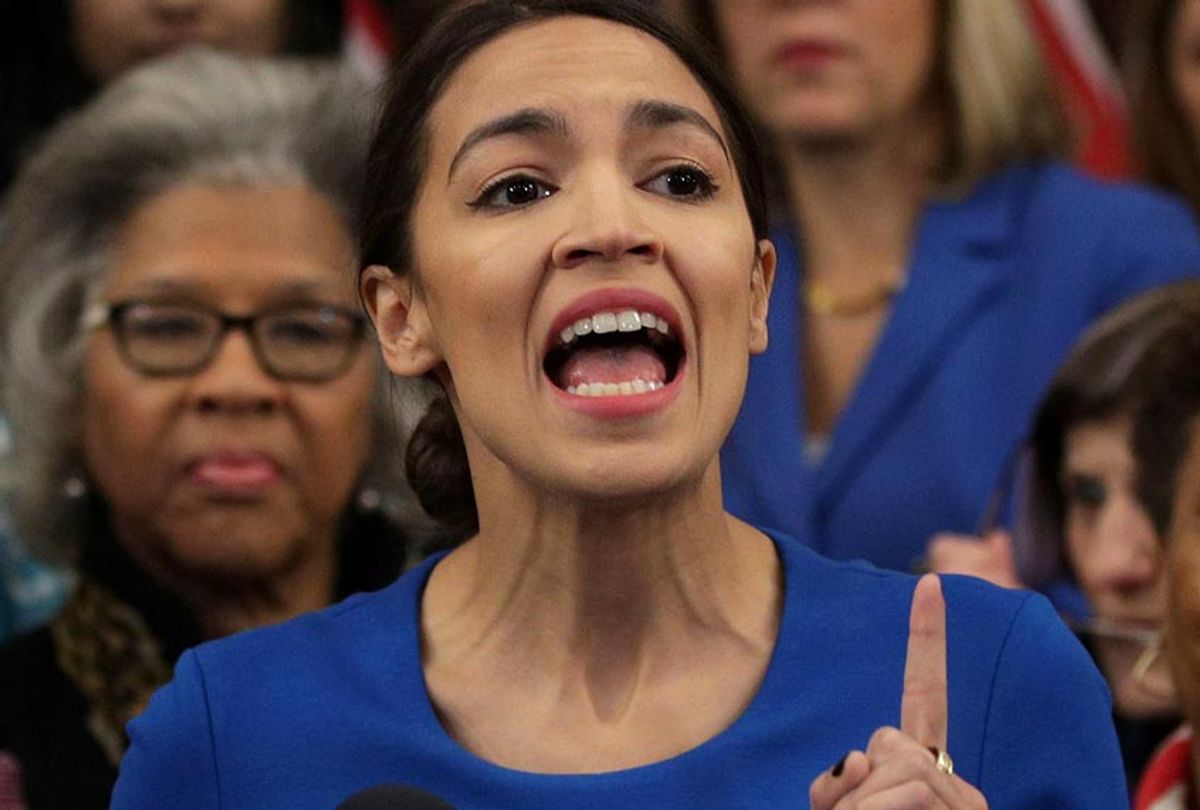More than a dozen progressive Democrats in the House of Representatives, including firebrand freshmen Reps. Alexandria Ocasio-Cortez of New York, Ilhan Omar of Minnesota and Rashida Tlaib of Michigan, have urged in a letter sent Thursday to President Donald Trump that his administration "change course" on its policy toward Venezuela.
The lawmakers, in a letter addressed to Secretary of State Mike Pompeo and first obtained by HuffPost, expressed concern over the Trump administration's suggestions of military intervention against Venezuelan President Nicolás Maduro. They also criticized the administration's imposition of economic sanctions against Maduro and Venezuela's state-owned oil company for "hurting ordinary people" and questioned the administration's decision to recognize Venezuelan opposition leader Juan Guaidó as the country's legitimate interim president "without a clear plan in place to hold democratic elections and avoid an escalation of violence."
The members of Congress pointed out that the economic and political crisis in Venezuela has already caused 3 million Venezuelans to flee the country and warned that the administration's "counterproductive" imposition of economic penalties and purported plans to stage military intervention in the country could cause the rate of migration to speed up and result in a "dramatic increase of refugees to the U.S."
The progressive lawmakers said they "strongly condemn the Maduro government's actions," which include "the killing of unarmed protesters, disregard for the rule of law, the holding of unfair elections, and blocking humanitarian aid from entering the country." Still, they wrote, "threats of military intervention against a failed autocrat who poses no threat to our national security is unacceptable," noting that U.S. military action in Venezuela would be unconstitutional without approval from the United Nations. Instead of military intervention, the lawmakers urged the administration to "join other countries in promoting Venezuelan efforts to achieve constructive dialogue and democratic solutions to the current political crisis."
"Threats and involvement in Venezuela's domestic affairs by the U.S. are counterproductive, as they play into the Venezuelan government's narrative that the opposition is a proxy for the U.S.," the letter states. "These actions help shore up Maduro's base and take attention away from urgent domestic issues." Said actions include the sanctions Trump slapped on Maduro in August 2017 and stepped up in January. The lawmakers claimed in the letter that the sanctions, as currently implemented, are "hurting the civilian population" and are "based on the questionable determination that Venezuela represents 'an unusual and extraordinary threat to the national security [...] of the United States.'"
Many Democrats, including House Speaker Nancy Pelosi, D-Calif., and Senate Minority Leader Chuck Schumer, D-N.Y., embraced Trump's recognition of Guaidó as the legitimate leader of Venezuela on Jan. 23, roughly two weeks after Maduro was inaugurated for a second term in an election marred by controversy and charges of corruption. Venezuela's opposition disputed the results, and the U.S., the European Union and a host of Latin American countries refused to accept Maduro's victory as legitimate. About 64 other nations have now thrown their support behind Guaidó, but only the U.S. has imposed economic sanctions on Venezuela. Its strategy to oust Maduro has become increasingly militaristic as Maduro has refused to step down. The United Nations, meanwhile, continues to recognize Maduro, although it has called for talks to ease tensions, as roughly 50-member nations have vowed to support Maduro, including U.S. political foes China, Cuba, Iran, North Korea, Russia and Syria.
As the U.S. has ramped up its efforts to dislodge Maduro, the Vatican and more than a dozen countries including Bolivia, Mexico, Uruguay and a coalition of European Union and Latin American nations are attempting to seek dialogue aimed at finding a peaceful solution between Maduro and the opposition. The U.S. is not included in those efforts, but the House Democrats said in their letter to Pompeo that the Trump administration should support efforts "to promote dialogue and help Venezuelans resolve their own problems."
The crisis in the South American country has spilled into the contest for the 2020 Democratic nomination for president, with most candidates and potential contenders revealing their positions. Sens. Kirsten Gillibrand of New York, Cory Booker of New Jersey, Amy Klobuchar of Minnesota, along with former Vice President Joe Biden and former Rep. John Delaney of Maryland have affirmed their support of Guaidó as the legitimate leader of Venezuela. Sen. Elizabeth Warren of Massachusetts said "Maduro is obviously a dictator" and suggested she approved of the "diplomatic part" of Trump's support of Guaidó, although she criticized his "saber rattling." Rep. Tulsi Gabbard of Hawaii said the U.S. should not "go in and choose who should be the leader of Venezuela. That is not something that serves the interests of the Venezuelan people."



Shares